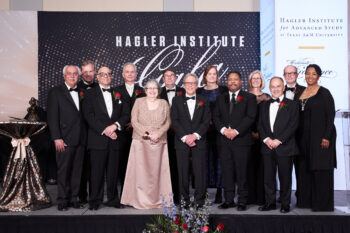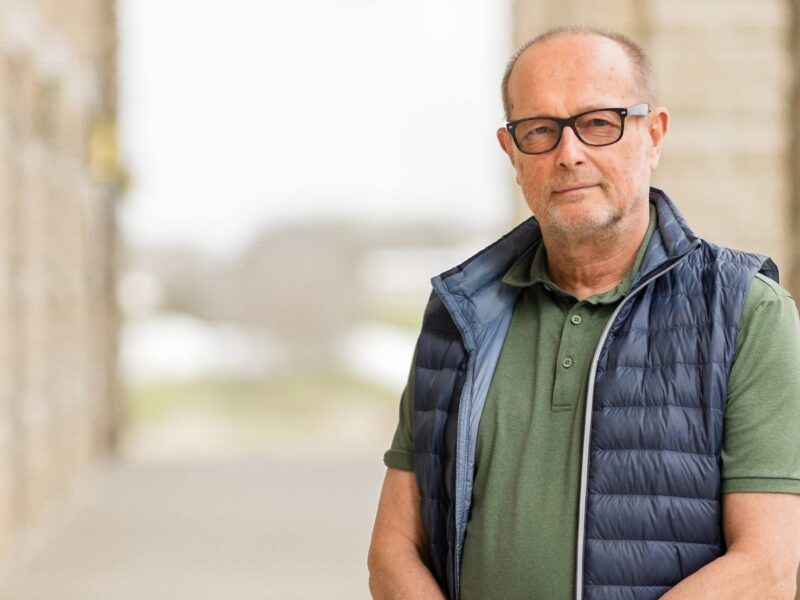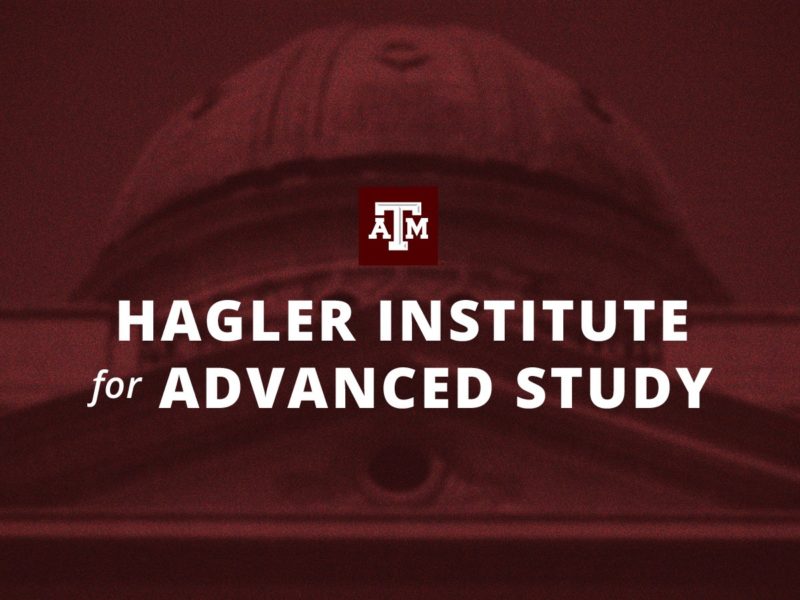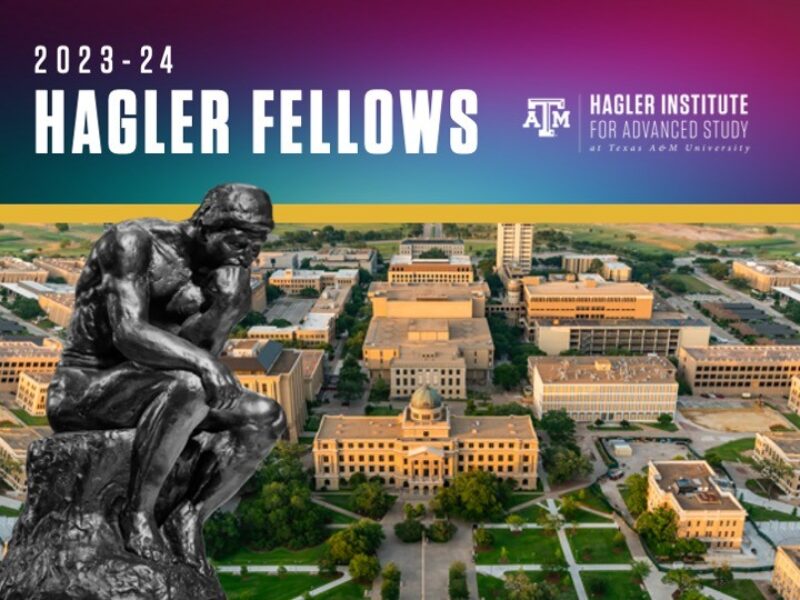Texas A&M Inducts Hagler Institute’s Class Of 2023-24

The Hagler Institute for Advanced Study at Texas A&M University inducted 14 Hagler Fellows and two Distinguished Lecturers — the largest class in its 13-year history — during its annual gala on Friday, March 1.
During a ceremony in Bethancourt Ballroom at the Memorial Student Center, Gen. (Ret.) Mark A. Welsh III, president of Texas A&M University, and Dr. John L. Junkins, the institute’s founding director, welcomed the institute’s latest class of scientists, engineers and scholars, all of whom are recognized internationally for their research and achievements.
The Class of 2023-24 includes two Nobel laureates and the first female astronaut of color to travel into space. Members of the new class will collaborate with faculty, researchers and students in the colleges of Arts and Sciences, Engineering, and Agriculture and Life Sciences; the schools of Medicine, Veterinary Medicine and Biomedical Sciences, Engineering Medicine, and Education and Human Development; and Texas A&M University at Galveston.
“Each of our Hagler Fellows and lecturers belongs to the National Academies of Sciences, Engineering and Medicine, or holds recognitions of equal stature in their field,” Junkins said. “All have achieved excellence in their careers, and the impact they will have on our campus is beyond measure.”
Since 2012, the Hagler Institute has attracted 126 world-class researchers to the Texas A&M campus: 116 Hagler Fellows and 10 Distinguished Lecturers. Of these, 16 have joined Texas A&M’s permanent faculty.
Previous classes of Hagler Fellows have included four Nobel laureates, a Wolf Prize recipient, a recipient of the Hubble Medal in Literature for Lifetime Achievement, a recipient of the National Medal of Science, an awardee of the National Medal of Technology and Innovation, a two-time recipient of the State Prize of Russia and a recipient of both the National Humanities Medal and the Johan Skytte Prize, the most prestigious award in political science.
The 14 new fellows are:
- Dr. Philip Calder, head, School of Human Development and Health, and professor, Nutritional Immunology, University of Southampton, United Kingdom, is known for his work in understanding how nutrition affects the functioning of the human body and developing strategies to lower disease risk and treat nutrition-related illnesses.
- Dr. Alicia L. Carriquiry, Distinguished Professor and holder of the President’s Chair in Statistics, and director, Center for Statistics and Applications in Forensic Evidence, Department of Statistics, Iowa State University, focuses her work on applications of statistics in human nutrition, bioinformatics, forensic sciences, and traffic safety.
- Dr. George Georgiou, professor, Cockrell School of Engineering, and holder of the Dula D. Cockrell Centennial Chair in Engineering #2, The University of Texas at Austin, conducts research that centers on analyzing adaptive immune response and improving enzyme and antibody therapeutics for cancer and inborn errors of metabolism.
- Dr. Jody Gookin, FluoroScience Distinguished Professor of Veterinary Scholars Research Education, College of Veterinary Medicine, North Carolina State University, is an internationally recognized expert in gastroenterology credited with the discovery of Tritrichomonas foetus as the most common, worldwide infectious cause of colitis in domestic cats.
- Dr. Mae Jemison, president, The Jemison Group Inc., is an engineer, entrepreneur, physician and educator working at the forefront of integrating the physical and social sciences with art and culture to solve problems and foster innovation, and the first woman of color to go into space, serving six years as a NASA astronaut.
- Dr. Eric S. Maskin, Adams University Professor and professor, Economics and Mathematics, Harvard University, is co-recipient of the 2007 Nobel Memorial Prize in Economics for advancing mechanism design: the study of when and how social and economic goals can be achieved through the design of new institutions.
- Dr. H. Richard Milner IV, professor of education, holder of the Cornelius Vanderbilt Chair of Education, immediate past Joseph A. Johnson, Jr. Distinguished Leadership Professor, Department of Teaching and Learning, professor of sociology (secondary), professor of education policy studies (secondary), and founding director, Initiative for Race Research and Justice, Peabody College of Education and Human Development, Vanderbilt University, whose work has influenced designs and implementation of curricular, assessment and instructional policies and practices in school districts across the United States and the world.
- Dr. Kyle Myers, principal, Puente Solutions LLC, whose work established next-generation study designs and evaluation methods for novel medical imaging and diagnostics products including digital mammography, 3D breast imaging, low-dose CT for lung cancer screening, and whole-slide digital pathology.
- Sir Konstantin Novoselov, director, Institute for Functional Intelligent Materials, and Tan Chin Tuan Centennial Professor, National University of Singapore, an expert in condensed matter physics, mesoscopic physics and nanotechnology, best known for isolating graphene at The University of Manchester in 2004, for which he shared the Nobel Prize in Physics in 2010.
- Dr. Eleftherios T. Papoutsakis, Unidel Eugene DuPont Chaired Professor, Chemical and Biomolecular Engineering, and professor, Biological Sciences, University of Delaware, a pioneer in metabolic engineering who discovered ways to manipulate complex cellular processes, leading to new methods for creating fuels, chemicals and therapeutic compounds.
- Dr. Radia Perlman, fellow, Dell EMC, a computer scientist who has been instrumental in the development and advancement of modern computer networks for three decades, making innovative contributions to network design and standardization, including the function of link-state routing protocols and spanning tree Ethernet.
- Dr. Soroosh Sorooshian, director, Center for Hydrometeorology and Remote Sensing, and Distinguished Professor and holder of the Henry Samueli Chair, The Henry Samueli School of Engineering University of California, Irvine, who has advanced water-resource systems through his application of remote sensing and development of improved precipitation runoff modeling.
- Dr. Robyn Tanguay, University Distinguished Professor, Environmental and Molecular Toxicology, director of the Superfund Research Program, the Sinnhuber Aquatic Research Laboratory, and former director of the Environmental Health Sciences Center, Oregon State University, who explores how to predict the damage that chemicals, nanomaterials and similar structures may inflict upon vertebrate development and function.
- Dr. Günter Wagner, research lab director, Systems Biology Institute, Alison Richard Professor Emeritus, Ecology and Evolutionary Biology, Yale University, and senior research fellow, University of Vienna, Austria, who is recognized for his groundbreaking research on the evolution of genes and gene regulatory network.
The two distinguished lecturers are:
- Dr. Julio M. Ottino, R.R. McCormick Institute Professor and Walter P. Murphy Professor, Chemical and Biological Engineering, Mechanical Engineering, former dean, R.R. McCormick School of Engineering and Applied Science, Professor of Management and Organizations, Kellogg School of Management, Northwestern University, who is known for developing and operationalizing whole-brain engineering, which merges analytical left-brain skills with right-brain creative skill to develop whole-brain engineers.
- Dr. Mark Zoback, Benjamin M. Page Professor, Geophysics, and director, Stanford Natural Gas Initiative, Stanford University, who is renowned for his research in reservoir geomechanics, conducting research on fault mechanics and reservoir geomechanics with an emphasis on induced seismicity, unconventional oil and gas production and CO2 sequestration.
In a separate ceremony, Junkins presented the institute’s inaugural Take Flight Leadership Award to Norm R. Augustine, former chairman and CEO for Lockheed Martin as well as the first chair of the Hagler Institute External Advisory Board. “For the first 12 years of the institute’s existence, Norm has contributed significantly to our success and culture,” Junkins said.
Media contact: Amanda Scott, 979-458-4989, arscott@tamu.edu





